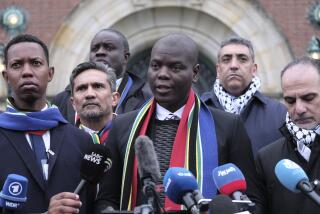U.N. Convicts 5 of Ethnic Cleansing
- Share via
PARIS — In a benchmark case firmly establishing “ethnic cleansing” as a crime against humanity, a U.N. tribunal convicted five ethnic Croats on Friday in a 1993 rampage of killing and destruction in a Bosnian town that left more than 100 Muslims dead.
The verdict by the International Criminal Tribunal for the Former Yugoslavia set a crucial precedent, court officials said, because the judges for the first time broadened existing international law to include ethnic cleansing. Widespread during Yugoslavia’s violent breakup, ethnic cleansing is the brutal practice of killing and terrorizing members of a given ethnic community to drive them from their homes and lands.
The five Croats were charged under the court’s statute on crimes against humanity, and most of the men were found guilty of the charge of “persecution.” They received prison sentences of as long as 25 years.
Court officials in The Hague predicted that Friday’s verdicts would make it easier in the future to prosecute others suspected of ethnic cleansing in Bosnia-Herzegovina or Yugoslavia’s Kosovo province.
“Now we know we can get convictions for ethnic cleansing and that the terror and murder and deportations inspired by it are crimes against humanity,” tribunal spokesman Paul Risley said in an interview. “And that has never before been spelled out.”
Risley said the verdict was groundbreaking because it was the first instance in The Hague in which defendants were accused solely of the practices that became infamous in the Balkans as ethnic cleansing--and not of war crimes or the most serious charge of all, genocide.
“This wasn’t about shelling, sniping, abuse of command authority,” Risley said. “This was a case where a specific number of individuals operating under cover of armed forces and military police entered a small village and deliberately murdered and terrorized Muslim inhabitants of this village.
“For the tribunal, this was a test of applying already existing international law toward a crime that essentially was invented during the breakup of the former Yugoslavia,” Risley said. “Even the term ‘ethnic cleansing’ wasn’t used before 1991.”
The five Bosnian Croat militiamen were accused of embarking on a terror campaign in Ahmici, a hamlet in mountainous central Bosnia, in the spring of 1993 during the former Yugoslav republic’s civil war. All of the village’s 172 Muslim homes and two mosques were destroyed.
Entire Muslim families were executed with machine guns, and their barns and livestock burned. According to British peacekeepers who arrived on the scene soon afterward, some of the victims were burned alive as well.
A total of 116 Muslims died, and all survivors fled, leaving the village to the Bosnian Croat militia known as the HVO. Not a single Croat-owned home was touched.
“Indisputably, what happened on April 16, 1993, has gone down in history as comprising one of the most vicious illustrations of man’s inhumanity to man,” Presiding Judge Antonio Cassese said as he handed down the verdict. “Today, the name of this small village must be added to the long list of previously unknown hamlets and towns that recall abhorrent misdeeds and make us shudder with horror and shame.”
Three of the defendants lived in Ahmici, and the acts they were charged with showed how Croats, Muslims and Serbs who had been neighbors for generations could turn on one another in the heat of the Bosnia’s 1992-95 war. One Muslim survivor testified that two of the accused, the Kupreskic brothers, had been “decent” young men until the fighting began.
According to Sakib Ahmic, the brothers invaded his home that April day, killed his son and daughter-in-law, and even killed his grandchildren, ages 3 and 4.
Vladimir Santic, at the time the local head of an infamous special Croatian military police unit known as the Jokers, was charged with ordering the massacre. He received the heaviest sentence--25 years--from the U.N. judges. One of his subordinates, Drago Josipovic, was given a 15-year prison term.
The brothers, Zoran and Mirjan Kupreskic, were sentenced to 10 and eight years, respectively. A cousin, Vlatko Kupreskic, a police operations officer who also lived in Ahmici, and whose home was used as a staging point for ethnic cleansing operations, got six years.
There was another defendant in the 15-month trial, Dragan Papic, but he was acquitted for lack of evidence. All six of the accused, the most tried at a single time by the tribunal, pleaded not guilty. Those convicted now have the right to appeal.
Prosecutors had argued for heavier sentences, but Cassese, the presiding judge, ruled that it was impossible to lay blame for specific murders in Ahmici.
It was the biggest trial yet in The Hague. Officials at the U.N.-established tribunal, where the first trials began in 1996, acknowledge that they are still feeling their way, with judges sometimes having to devise procedure as they go along.
In late February or early March, trial should begin of three Bosnian Serbs accused of imprisoning thousands of Muslim women in a high school and raping many of them repeatedly--another benchmark case, because it marks the first time rape is being prosecuted as a war crime.
In a separate case, Bosnian Serb Gen. Radislav Krstic is to stand trial for allegedly overseeing the massacre of 7,000 Muslims in the northeastern town of Srebrenica in the summer of 1995, in what has been called the worst atrocity of the war.
The highest-ranking figures charged by the international tribunal--Yugoslav President Slobodan Milosevic and wartime Bosnian Serb leaders Radovan Karadzic and Gen. Ratko Mladic--remain at large.
More to Read
Sign up for Essential California
The most important California stories and recommendations in your inbox every morning.
You may occasionally receive promotional content from the Los Angeles Times.













